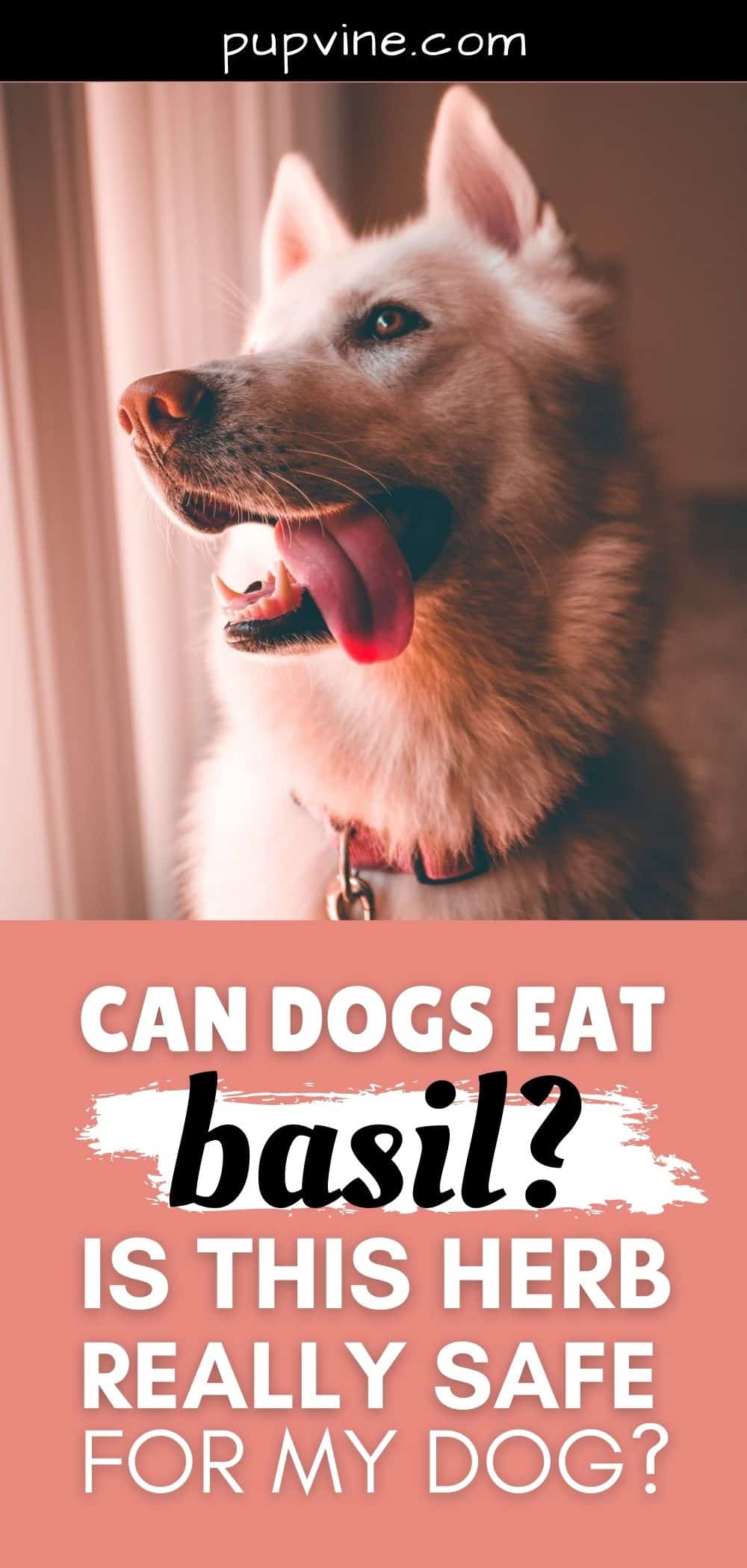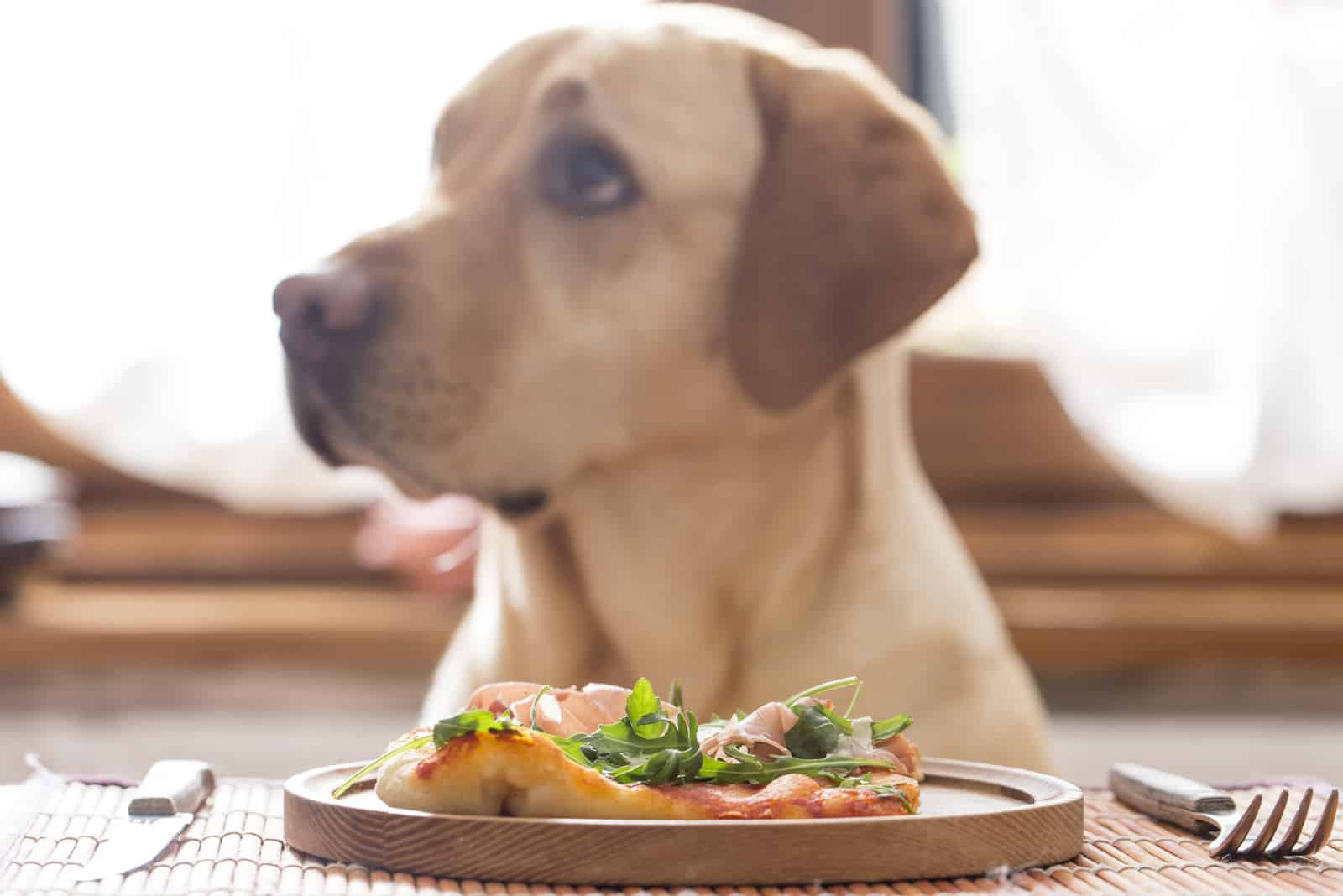From sweet to holy basil, this herb is one of the most recognizable ones in the world.
We already know how tasty basil is. It has many benefits that could help our overall health status.
Even though we’re taught not to feed our dogs human food, we can’t help but wonder: Can dogs eat basil? Is this herb / spice good for our furry pals?
Sure, adding some basil to doggy meals or mixing it with kibble can do no harm. Right? Well, we’ll see…
I won’t leave you puzzled for too long. Let’s jump right into the matter and sprinkle the truth!
So, Can Dogs Eat Basil?
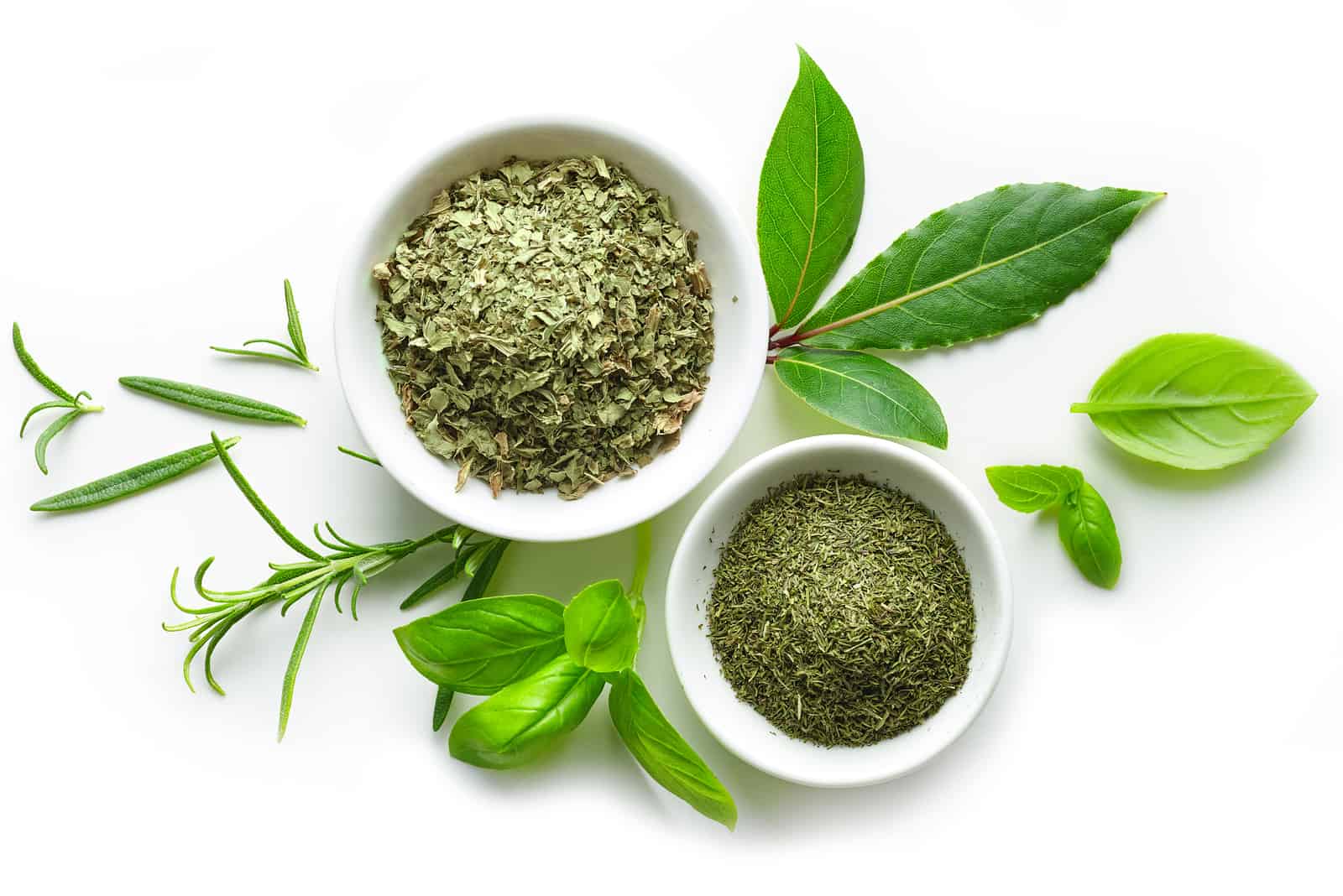
Let’s give you the answer to the question you’re dying to hear!
Yes, dogs can eat basil. It’s not a harmful ingredient for them unlike some others we’ll discuss later.
Of course, this doesn’t mean you should feed your dog lots of basil. There is a determined amount which is safe for your dog. Nothing is good if consumed in large amounts.
Make sure you feed your dog food that is rich in proteins, vitamins, and fibers. Supplements like basil are just a great addition to every diet.
Health Benefits Of Basil: Why Is It Good For Your Dog?
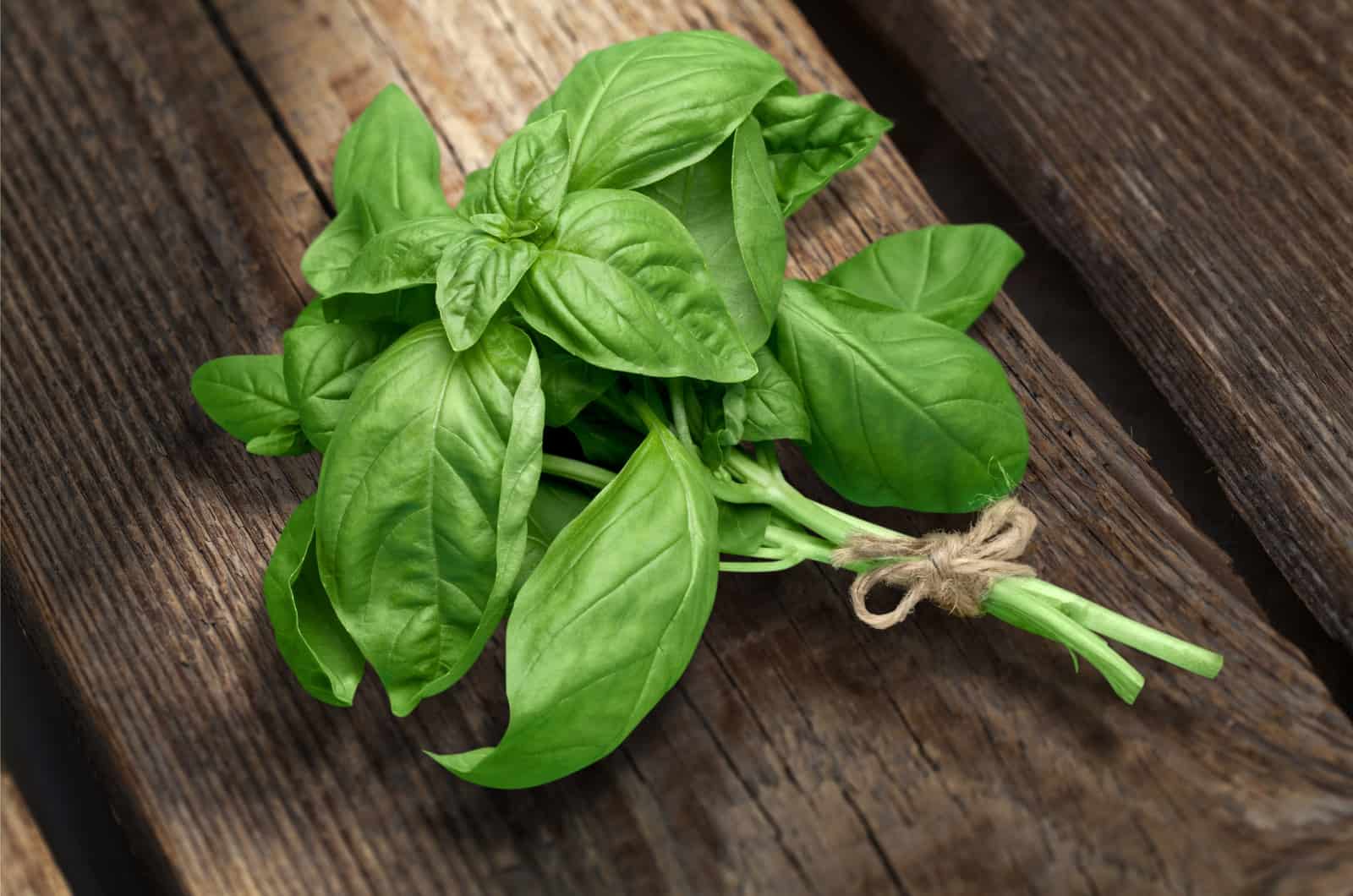
Besides being so yummy, basil is known for having numerous benefits that can affect your and your dog’s diet significantly.
When talking about basil’s benefits, we must mention the triple-A features: the antimicrobial, antiviral, and antioxidant traits. It has been proven that regular use of basil reduces hotspots on a dog’s body, and acts like a natural anti-inflammatory medicine.
Basil brings lots of health benefits, and now we’re going to discuss them all!
Anti-inflammatory Features
Prevention gets the job half-done. It’s too late to treat problems once the symptoms get worse. Standard medicines and painkillers will only numb the pain. But, rarely any medication will cut the problem at the root and prevent further issues.
Well, basil does exactly this!
Since a lot of dog breeds, especially large ones, are prone to arthritis in their senior years, basil can help with this issue. It reduces pain and nips the problem in the bud.
Golden Years Diseases
Speaking of senior years…
Sadly, many health problems occur when a dog reaches its senior years. Arthritis is just one of them. Just imagine how many other chronic conditions can be prevented with a healthy dose of basil!
Your dog’s health should be as important as your own.
Why wouldn’t you do your best to have your pooch all happy and healthy in its senior years?
Cancer Fighter
Just like people, dogs can suffer from different types of cancer, too.
Every dog owner should be ready to face the fact that one day, his dear furry friend may become ill of cancer. It affects all breeds – large and small dogs, too.
You can’t fully prevent it unless you enrich your dog’s diet with supplements like basil.
Are you aware of how many antioxidants basil contains? Seriously, the high levels of antioxidants have proven to be very effective in fighting cancer cells. That’s another reason why giving basil to dogs is such a terrific idea!
No Cellular Damage
Thanks to its free radicals, basil prevents further cell damage. Also, the large quantities of antioxidants can help restore cellular damage!
I find this quite surprising. No wonder why there are so many dog treat recipes including basil. I’m gonna make some for my buddies immediately!
Calming Effect
Is your dog suffering from anxiety of any kind? Is he on prescription medicine?
I’m sorry to hear that. I bet you’re trying to figure out a way that will reduce the stress and leave your dog free from anxiety.
Maybe you should try supplements with basil. The many health benefits of this herb have been recognized by the pharmaceutical industry; hence, the many anxiety meds that feature basil as the number one ingredient.
The Abundance Of Goodness
Sure, basil is healthy, but what kind of vitamins and minerals are packed inside?
Let’s see…
Basil is rich in vitamin c, vitamin a, b complex, vitamin k, potassium, calcium, and iron, as well as essential oils rich in anti-fungal features.
It promotes a nice, shiny coat and soft skin. What else can you wish for coat-wise?
What Is Basil: An Herb Or A Spice?
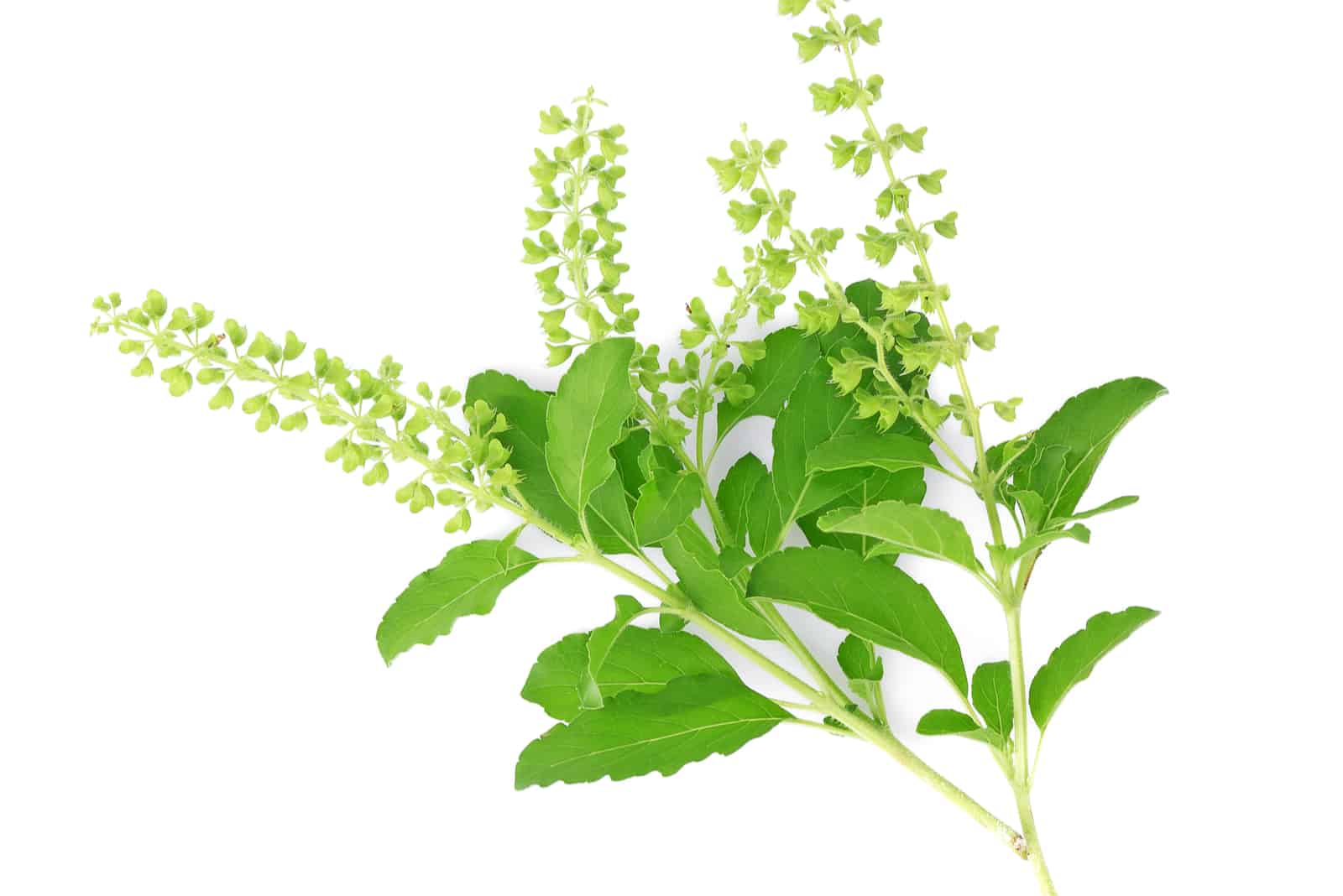 Basil is an herb. It comes from the family of mints.
Basil is an herb. It comes from the family of mints.
Many people have issues with determining what exactly basil is. But, that’s a trick question: basil can be both an herb and a spice!
Fresh basil, with its rubbery leaves, should be used at the end of the cooking process to preserve its nutritional value. Or, you can use it raw in salads.
Dried basil has more flavor, and it should be used at the start of the cooking process.
Now that we have this dilemma solved, let’s move on to more interesting parts and see why basil is so good for both us and our canine friends.
You will be surprised with what you’re about to learn.
How Does Basil Taste, And Do Dogs Like It?
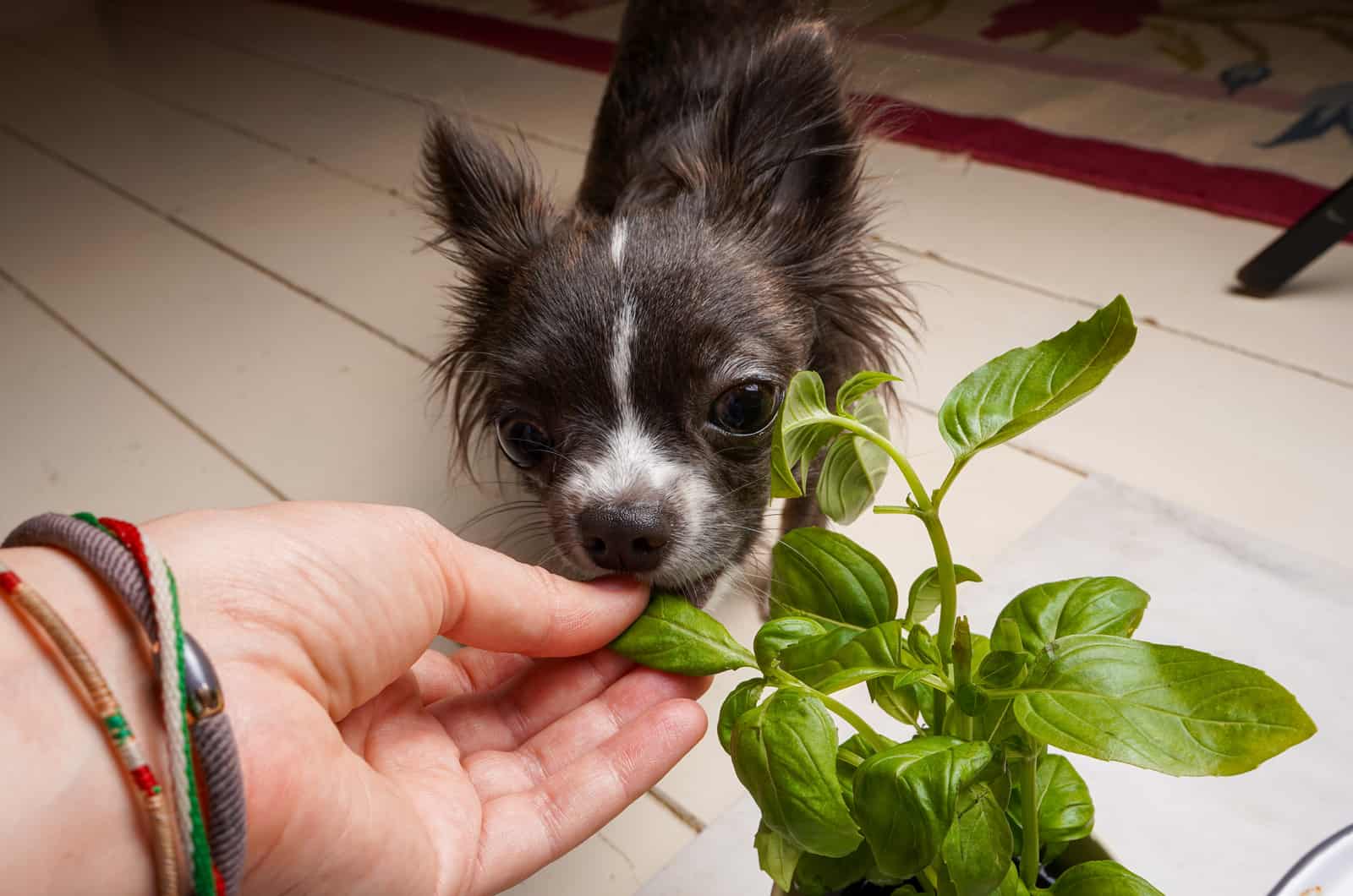
I’m sure some of you still haven’t used basil in your meals. Don’t worry – it’s not a staple in every kitchen despite its world popularity.
Unless your family comes from Italy and loves basil in every meal, you’re probably wondering what basil tastes like.
As someone who once was a picky eater, I have to admit I didn’t like basil at first. It’s kind of hard to explain the taste to someone who has no idea about basil’s taste.
This herb has a strong and sharp taste. It may remind you of black pepper with some anise flavor. But, it’s not hard and it doesn’t kill all your tastebuds. Basil actually gives a note of freshness to every meal.
But, this was fresh basil.
How about the dried version? Is it the same?
Dried basil has the same structure and almost the same taste as dried oregano. While fresh basil has a rubbery texture, dried basil only leaves the flavor while the texture disappears into the meal.
How Much Basil Is Okay?
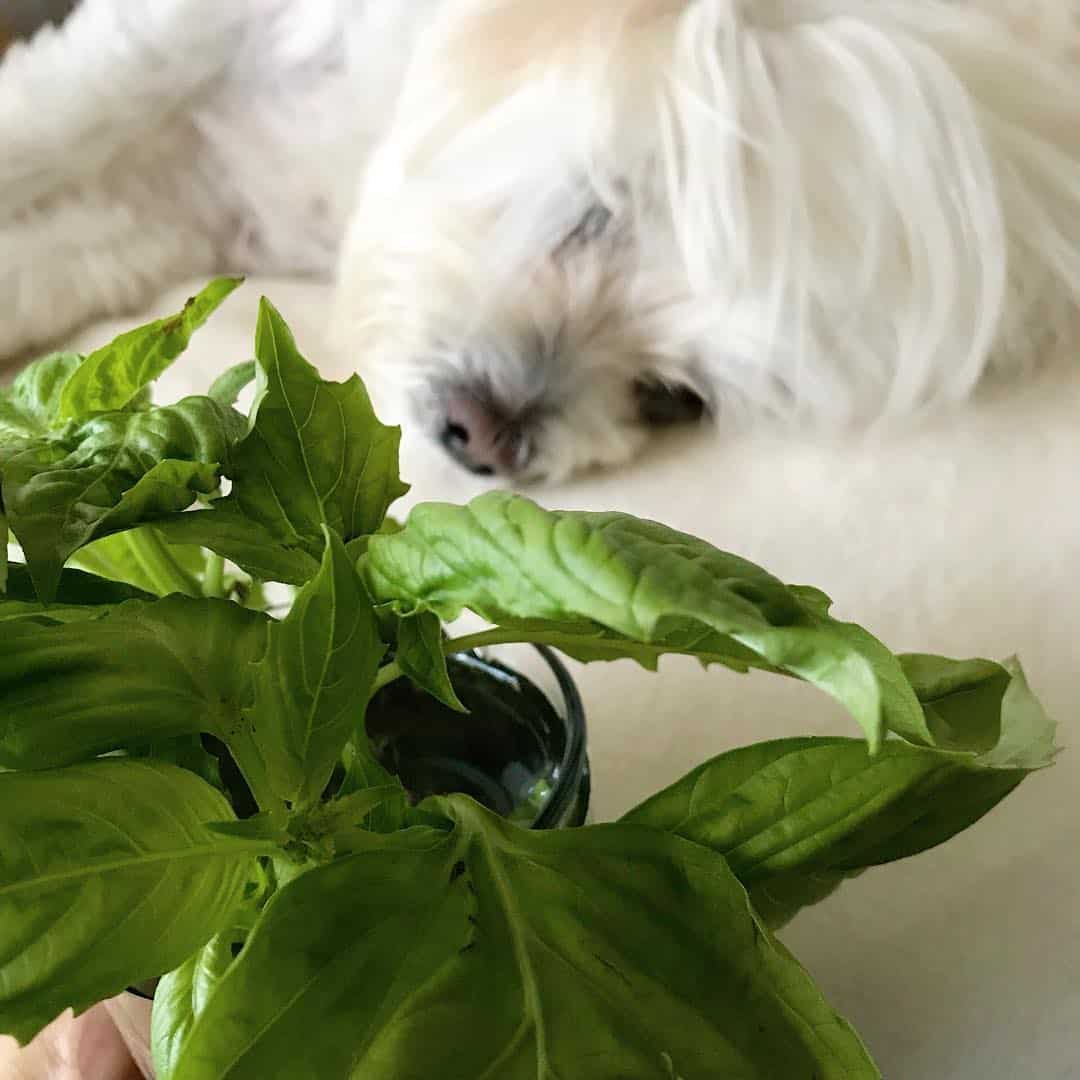
Photo from: @lorentix1
Basil is healthy. But, too much basil isn’t. It’s as simple as that!
You can take the most healthy food of them all, and you will still have side effects from excessive amounts.
Basil has a strong taste. It’s quite overwhelming and dominant over other flavors. If I were you, I wouldn’t go overboard with using it.
Focus on smallquantities. Don’t just let your dog eat fresh basil. Use it in a dog-friendly recipe for a meal or a treat.
Trust me when I say: a small amount of basil is healthy. Using it too much? Not so much!
Why Basil Can Be Dangerous For Your Dog?

Sure, basil is fine in a certain amount. But, feeding your dog only basil is ridiculous!
Despite its many benefits, basil can still be a bit dangerous for your dog. That’s why you should only use it as a sporadic addition to your dog’s diet. Make sure you focus on real animal proteins, whole grains, fruits, veggies, and herbs as only fillers.
Is Your Dog Allergic?
Some canines show signs of allergic reactions when in contact with certain foods.
If your dog has a sensitive tummy, you should be cautious when introducing basil for the first time. Try giving a small amount, and then increase it gradually up to your desired amount. If your dog is allergic, he should show signs immediately.
Sings of basil-related allergies are usually sneezing, followed by body swelling (if ingested), rash, hives, vomiting, and a runny stool. You should take your dog for a vet checkup as soon as the symptoms appear in order to prevent further complications.
Tummy And Skin Problems
As noted in the symptoms of allergic reaction to basil, dogs can experience tummy issues and severe skin reactions.
Many dogs will exhibit diarrhea or vomiting if some ingredient doesn’t agree with them.
Also, the signs of discomfort will show up on the skin in the form of hives or rashes.
These signs may not only be linked to allergies. They can also appear if your dog eats too much basil.
Remember, moderation is the key to a healthy diet.
Recipe Ideas With Basil For Dogs
Many of you like to experiment with giving raw food or human food to your dogs. In one way, that’s totally fine. Human food can be altered to fit dogs. What you need to be careful about are store-bought meals that seem to fit humans and canines, too.
Well, they only seem to.
You never know what kind of preservatives are hidden inside those meals!
That’s why I always recommend making the meal on your own if you’ve got time on your hands. Dogs like the taste of raw food. After all, it is their primary preference.
Here, I have some nifty meal ideas to make for your dog that include basil. And, no, I’m not including pesto pasta. Homemade pesto sure is tastier and healthier than the store-bought one. However, I don’t recommend making it for your dog because it contains ingredients like garlic or pine nuts.
Chicken With Basil And Broccoli
Now, I’m not sharing any measurements with you because you can make as much as you like. But, don’t go overboard with basil. A couple of teaspoons depending on whether you’re making a large batch or just one meal will be enough.
Simply cook some broccoli, chop it, and put it aside. Cook chicken thoroughly to prevent bacteria development. In one mixing bowl, combine the chicken, broccoli, two tablespoons of basil, and some olive oil.
This should be a very satisfying meal for your pooch.
Don’t worry about giving your dog broccoli or olive oil. The oil helps with bowel movement, while broccoli is packed with vitamin C and fibers.
All in all, this is a pretty simple, but still terrific meal idea.
Basil Chicken Liver Cookies
Homemade dog meals aren’t only about cooking some proteins and veggies and mixing them together.
I’ve got a pretty cool idea for you, and it’s about baking dog cookies, or biscuits if you like that term more.
These basil chicken liver cookies are very easy to make, and you’ll always have them ready for your dog. They also seem to help a lot during training lessons as a stimulation for a job well-done.
To make these biscuits, you’ll need to cook some chicken liver first, and then dice it finely. Once again, no measurements so you can make as much as you want!
Add the liver into a bowl, followed by some freshly chopped basil leaves, a bit of parmesan, regular yogurt, and some spelt flour until you get the consistency right. It shouldn’t be runny, or too thick either.
You should be able to mix it thoroughly and get a compact mass. Roll the mass into a 1/2-inch thick sheet and use a cookie cutter to make cookies. Pop them in the oven and bake for 10 to 15 minutes.
These biscuits can last for quite a while, and I guarantee your dog will love it.
Can Dogs Eat Pesto?
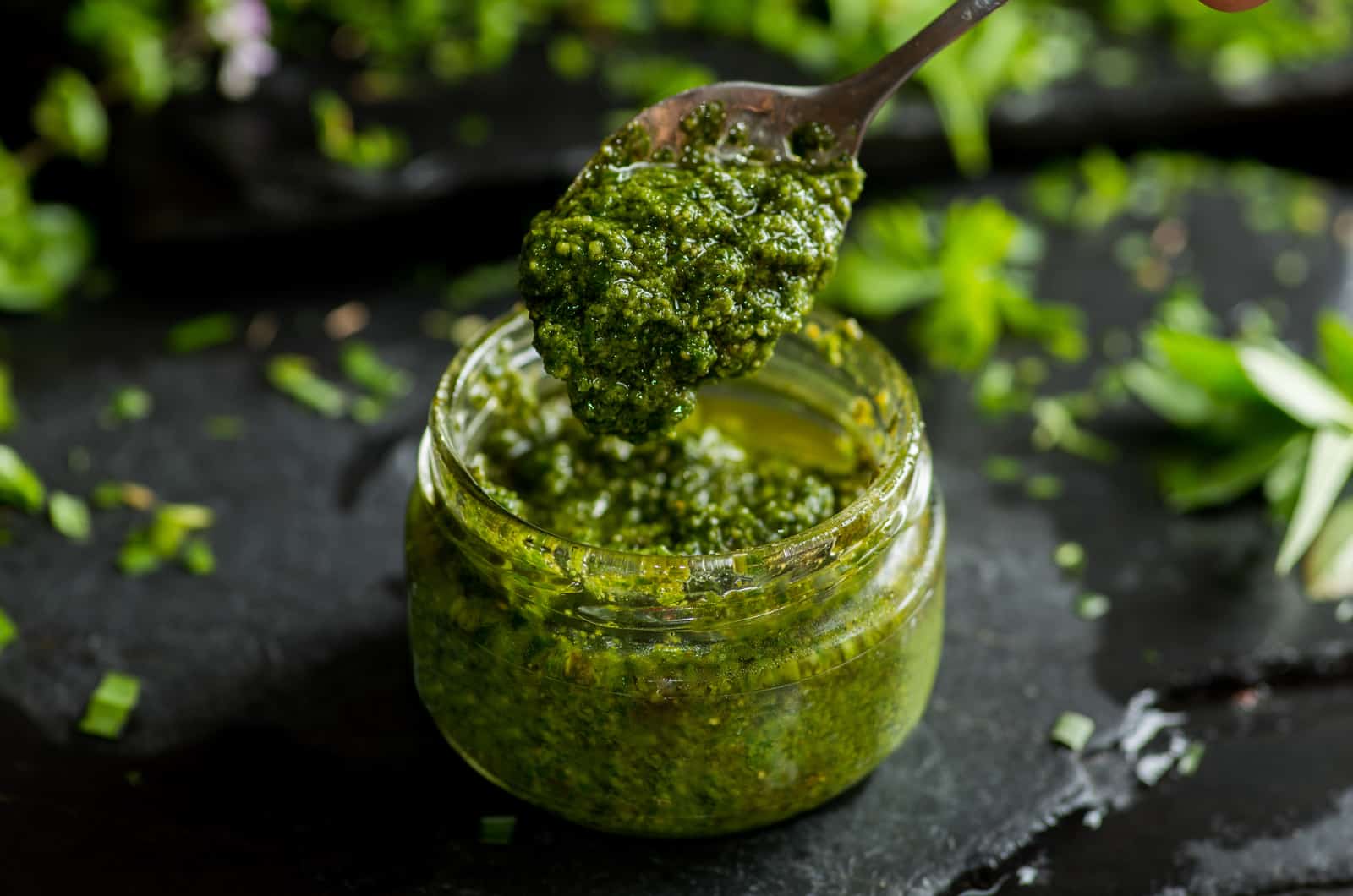
In case you’re not sure, here’s what pesto sauce contains:
basil
parmesan
pine nuts
garlic
olive oil
salt
That’s pretty simple, isn’t it?
Yes, but I still wouldn’t feed my dog pesto because it contains garlic, pine nuts, salt, and parmesan. These aren’t good for our Fidos at all, so avoid pesto… please.
Can Dogs Eat Herbs? Which Are Okay For My Dog?
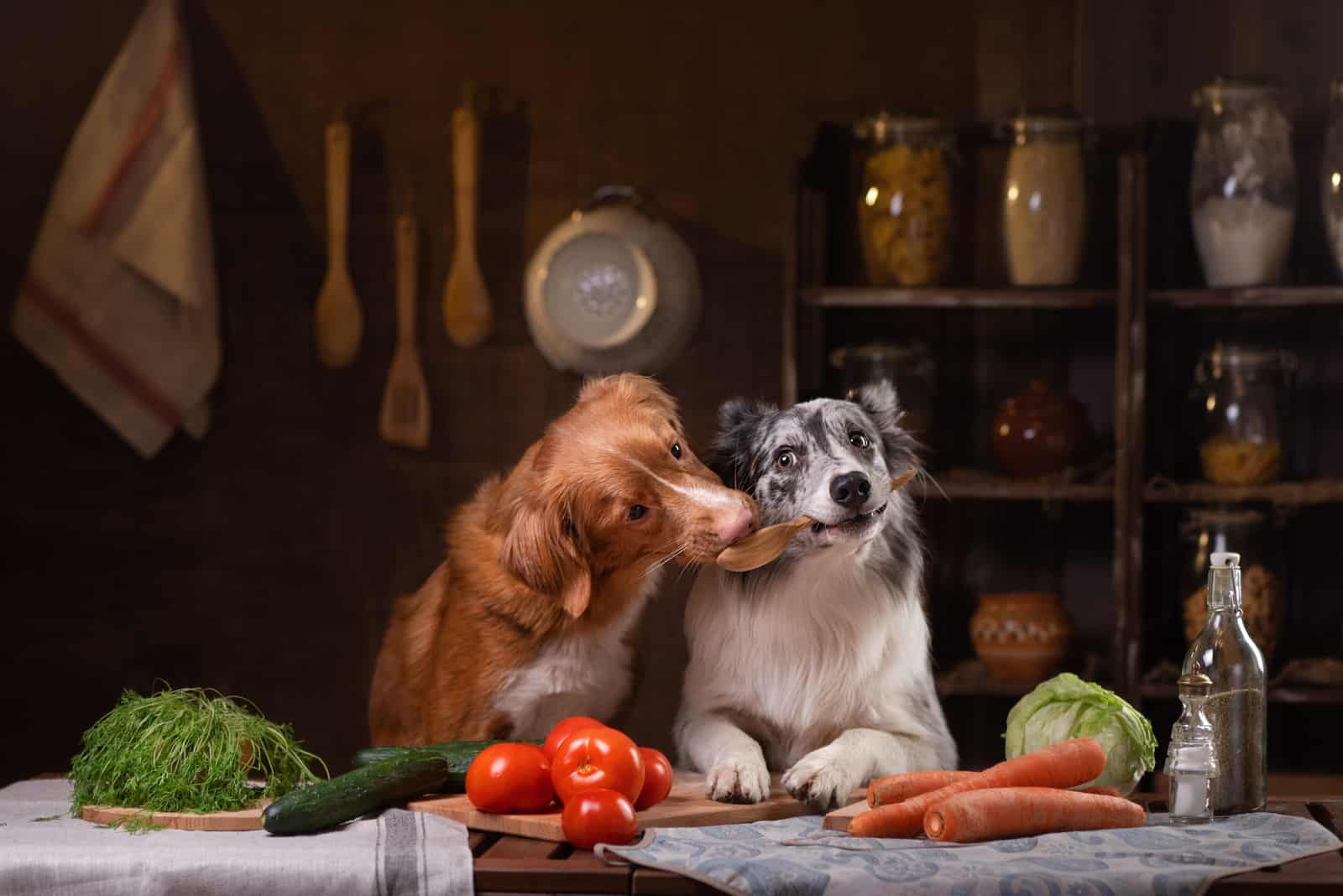
Besides basil, we have some other plants that help with our dogs’ health issues. They compliment basil very well, and you can use them as a combination or on their own.
Rosemary
This plant also has antimicrobial and anti-inflammatory properties. It’s delicious and should be incorporated into dog meals. Still, I would be careful and keep the dosage really small, i.e., a little teaspoon would be just fine.
Turmeric
Turmeric is known for its traits to calm down an upset stomach when a dog has digestive problems. But, that’s not the only thing that’s great about tumeric. It also relieves arthritis pain. I believe these are enough reasons to use tumeric in your dog’s diet.
Oregano
Just like basil, oregano has the triple-A properties. It works wonders on a dog’s immune system, not to mention it relieves troubles with the digestive system. No more doggy diarrhea with oregano!
Cinnamon
When introducing new food into your dog’s life, it’s important that you do it gradually, especially with cinnamon. Due to its powdery texture, cinnamon is a bit tricky to use. Still, it doesn’t deny the fact that cinnamon is precious.
This spice reduces high blood sugar, and it also helps with many heart diseases.
Peppermint
The many health benefits of peppermint are already very familiar to we humans.
We use peppermint tea to calm our upset tummies, while dogs use real peppermint in their food for many other things.
Peppermint is known as a great help with irritable bowel syndrome (IBS) and gassiness.
Thyme
Thyme is another herb/spice that is excellent for digestive problems. What’s so amazing is that thyme fights against parasites that may be hiding inside your dog, i.e., hookworm.
Still, you shouldn’t use more than a small teaspoon of thyme per dog meal.
Parsley
Name a dish that doesn’t get better with a pinch of parsley!
Even our canine friends enjoy some. Parsley adds a healthy dose of fibers to your dog’s diet.
Oh, and it also helps a lot with that doggy breath.
Which Herbs Or Spices Aren’t Okay For My Dog?
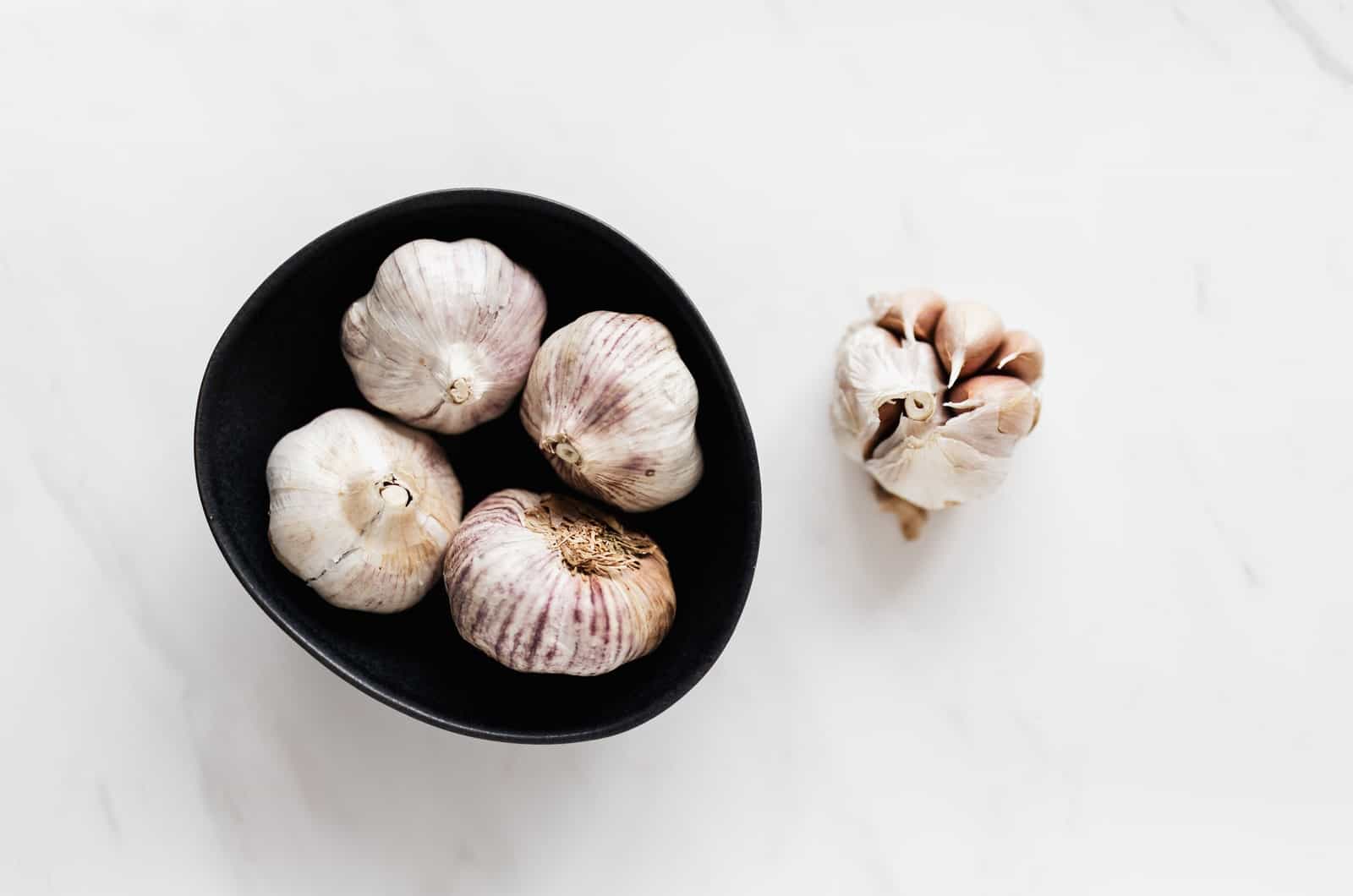
Not only are they not okay, but these herbs or spices can be severely dangerous for your dog, even if consumed in small amounts!
Garlic
Garlic, onions, chives, leaks, and all sorts of garlic relatives are strictly prohibited from feeding your dog. This herb affects the dog’s digestive system, causes vomiting and diarrhea, and affects the heart rate significantly.
Black Pepper
To be precise, black pepper isn’t dangerous for your dog, but piperine is if your dog is on prescription.
This alkaloid may lead your dog to becoming overdosed on certain medicines.
Aloe vera
This is a pretty common plant found in many households. But, aloe vera, besides its many benefits, also hides some secrets. If your dog consumes it, it may lead to vomiting, diarrhea, or behavioral issues like depression or lethargy.
Conclusion
The answer to the question: “Can dogs eat basil?” is pretty simple.
Yes, dogs can eat basil, but keep the consumption low.
If you’re a dog owner and you really care about your dog’s diet, I’d recommend you incorporate this herb / spice into your dog’s meals.
As you can see, basil has the triple-A properties of being an anti-inflammatory, antioxidant, and antiviral. These benefits are proven to significantly help with your dog’s overall health.
In fact, basil even helps fight cancer cells and reduces severe pain.
If these aren’t enough reasons why basil should be used in your dog’s diet, nothing will be.
Basil is delicious, healthy, and perfectly safe for dogs.
So, run over to Amazon and order some basil seeds for your little herb garden.
Relatable content
It’s always very tricky to figure out which food is safe for our canine buddies and which is not.
To help you out a bit, PupVine’s got some pretty great content on the do’s and don’ts of human food.
Your dog has a green light for eating:
But, make sure you avoid these foods:
